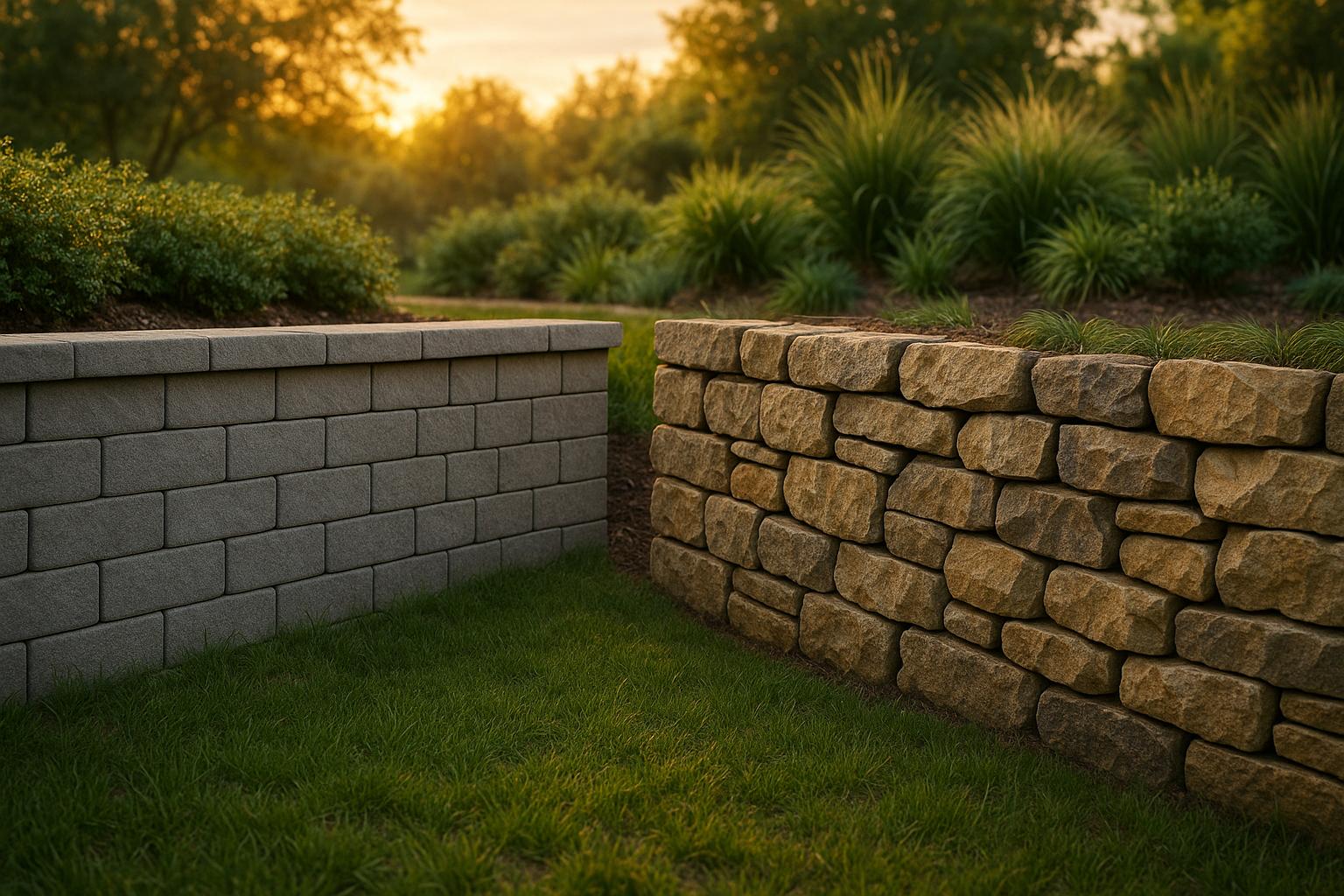- bhavya gada
- No Comments
When choosing between pavers and natural stone for your retaining wall, the decision comes down to cost, durability, maintenance, and design preferences.
- Pavers: Cost-effective, easier to install, and available in a variety of colors and textures. They last 25–40 years and are easier to repair but may fade or shift over time. Best for modern, clean designs.
- Natural Stone: Offers a timeless, rustic look with unmatched durability, lasting over 50 years. However, it’s more expensive ($25–$50+ per square foot) and requires skilled installation. Ideal for classic or earthy landscapes.
Maryland homeowners should also consider soil conditions and drainage when selecting materials. Hiring a contractor with local expertise ensures a long-lasting and visually appealing retaining wall.
Quick Comparison
| Feature | Pavers | Natural Stone |
|---|---|---|
| Cost | $15–$30 per square foot | $25–$50+ per square foot |
| Durability | 25–40 years | 50+ years |
| Design | Modern, uniform look | Rustic, natural textures |
| Installation | Faster, simpler process | Time-consuming, skilled labor |
| Maintenance | Easier to repair and clean | Requires more attention over time |
Both materials have their strengths and limitations, so your choice depends on your budget, style, and property needs.
DIY Small Retaining Wall Build (Small Pavers) 2022
Natural Stone Retaining Walls
Natural stone walls bring a classic, earthy charm to any landscape. By using quarried materials such as limestone, sandstone, granite, or fieldstone, these walls showcase unique textures and colors that can perfectly complement your property’s natural elements.
Building with natural stone requires a meticulous approach. Each stone – irregular in shape – must be carefully chosen and positioned to create that signature rustic look many homeowners love.
These walls are particularly well-suited for traditional or rustic landscape designs. They seamlessly integrate with natural surroundings like mature trees, rock formations, and wooded areas. Maryland’s diverse landscapes make natural stone a popular choice for homeowners looking to enhance their outdoor spaces.
Benefits of Natural Stone
Natural stone offers several advantages that make it a standout option:
- Timeless beauty: Its aesthetic appeal is unmatched, fitting effortlessly into both historic and contemporary Maryland properties.
- Durability that lasts: When built properly, natural stone walls can endure for decades – or even centuries. They naturally resist weathering, freeze-thaw cycles, and other environmental challenges typical of Maryland’s climate.
- Distinct character: Each stone wall is one of a kind. Limestone provides soft, light tones for a polished look. Fieldstone offers a weathered, rustic charm, while granite’s bold colors and dramatic patterns make a striking statement.
- Eco-friendly choice: Natural stone doesn’t require manufacturing processes that release harmful emissions. Once the wall’s lifespan ends, the stones can be reused or reintegrated into the environment without causing harm.
Drawbacks of Natural Stone
While natural stone has undeniable appeal, it’s not without its challenges:
- Higher costs and longer installation times: Material costs range from $15–$30 per square foot, and the labor-intensive process can make projects more expensive and time-consuming. The irregular shapes also result in more material waste during installation.
- Inconsistent appearance: Variations in stone shape and color, while adding character, can make achieving a uniform look difficult. Over time, these differences may become more noticeable.
- Limited availability: Specific stone types may not always be in stock. Local quarries might face seasonal restrictions, and sourcing stones from farther away can drive up transportation costs.
- Specialized expertise required: Installing natural stone walls demands skilled masons with experience in handling irregular materials. Unlike standard paver installations, natural stone construction requires advanced techniques to ensure a sturdy and visually appealing result.
Paver Retaining Walls
Paver retaining walls bring a sleek, modern approach to building retaining structures. These walls use specially engineered concrete blocks, designed with consistent dimensions to ensure precise and efficient assembly.
Brands like Allan Block, Versa-Lok, and Belgard are popular in this space, offering a variety of styles. You can choose from smooth, contemporary finishes to textured options that imitate the look of natural stone.
These walls are particularly suited for modern and formal landscaping projects. Their clean, uniform appearance complements contemporary architecture and structured garden designs. They’re a top choice for creating geometric pool areas, polished patios, or unique outdoor living spaces.
Here’s a closer look at why paver retaining walls are a smart option for today’s landscapes.
Benefits of Pavers
Paver retaining walls come with several standout advantages:
- Cost savings. Compared to natural stone, pavers are often more budget-friendly. Their standardized production process helps keep costs consistent, and buying in bulk can lower expenses even further.
- Quick installation. Thanks to their interlocking design, pavers often don’t require mortar. This makes the construction process faster and more predictable than working with natural stone.
- Versatile design options. Pavers come in a wide range of colors and textures, offering the look of natural materials while supporting various styles and aesthetics.
- Low maintenance. If a block gets damaged, you can replace it individually without tearing down the whole wall. They’re also easy to clean and tend to resist stains better than natural stone.
- Reliable engineering. Paver systems are built for durability. They’re designed to handle heavy loads, resist freeze-thaw cycles, and allow for precise drainage and reinforcement due to their uniform dimensions.
Drawbacks of Pavers
While paver retaining walls have plenty of advantages, they’re not without a few downsides:
- Repetitive appearance. The uniformity of pavers can make long walls look less natural and somewhat monotonous.
- Fading over time. Lower-quality pavers may fade when exposed to UV light. However, premium options with UV-resistant additives tend to hold their color longer.
- Ongoing maintenance. While replacing individual blocks is simple, regular upkeep is needed to prevent weeds from growing between joints and to address any settling issues. You may also need to periodically replenish joint sand to maintain stability.
- Impact of temperature changes. Concrete pavers can expand and contract with temperature shifts more than natural stone. This may cause minor gaps or shifting over time, which might require occasional adjustments.
Paver retaining walls strike a balance between modern aesthetics and practical functionality, making them a go-to option for many homeowners and landscapers. However, understanding both their strengths and limitations can help you decide if they’re the right fit for your project.
sbb-itb-843f8be
Paver vs Natural Stone Comparison
When deciding between pavers and natural stone, their ability to enhance the look of your outdoor space is a major consideration.
Aesthetic versatility plays a crucial role in defining the overall style of your landscape. Pavers offer a wide range of choices in colors, shapes, and sizes [1][2][3]. Their consistent and polished appearance lends itself well to modern, formal, and contemporary designs. On the other hand, natural stone brings a rustic charm with its irregular patterns, textures, and hues, creating a one-of-a-kind, timeless appeal [1][2][3].
Material Comparison Chart
| Aspect | Pavers | Natural Stone |
|---|---|---|
| Aesthetic Versatility | Offers a broad selection of uniform designs for a clean, structured look. | Features organic variations, providing a rustic and uniquely natural appearance. |
Your choice ultimately depends on the style you’re aiming for. Pavers are ideal for a neat, predictable finish, while natural stone is perfect for those seeking a unique, classic vibe. Up next, learn about hiring skilled retaining wall contractors in Maryland.
How to Hire Retaining Wall Contractors in Maryland
When planning a retaining wall project in Maryland, it’s important to find contractors who understand the region’s unique soil conditions. Here’s what to consider when hiring the right professional for the job.
What to Look for in a Contractor
Start by confirming the contractor’s licensing and insurance. Always verify that their credentials are up-to-date before moving forward.
Next, check for local soil expertise. Maryland’s clay-heavy soils and varying drainage conditions can significantly impact the stability of retaining walls. A knowledgeable contractor should understand the differences in soil types across areas like Howard County and Baltimore County. They should also explain how these factors will influence your specific project, from foundation requirements to drainage solutions.
Material knowledge is another key factor. Whether you’re considering pavers or natural stone, choose a contractor experienced with both. They should be able to explain how each material performs under local conditions and guide you to the best choice for your project.
Don’t overlook drainage experience. Proper drainage is critical for retaining wall durability, and a good contractor will address this during their initial assessment.
Ask for references and a portfolio to evaluate the contractor’s work quality and reliability. Request to see recent projects in your area and ask for contact information for past clients. Reputable professionals are often happy to share this information and may even arrange for you to visit completed projects.
Finally, review detailed estimates. Professional contractors provide clear, written estimates that break down costs for materials, labor, permits, and timelines. They should also discuss potential challenges and how they plan to handle them. A contractor who is transparent about material selection and installation methods ensures a durable and visually appealing result.
These qualifications can help you identify trustworthy contractors, such as Pro Landscapes MD.
Pro Landscapes MD Services

Pro Landscapes MD specializes in building retaining walls with pavers and natural stone throughout central Maryland. Their team is well-versed in the area’s unique soil conditions, from the clay-heavy soils in Montgomery County to the varied terrains across the region.
Their expertise goes beyond installation to include comprehensive drainage solutions, which are essential for long-lasting retaining walls in Maryland’s climate. Their services cover drainage installation, French drains, and stormwater management systems, all integrated into the retaining wall construction process.
Pro Landscapes MD serves a wide range of communities, including Howard County, Montgomery County, Carroll County, Frederick County, Prince George’s County, and Baltimore County. This extensive service area gives them deep insight into local soil types and building codes.
Their process includes a thorough site evaluation, guidance on material selection, and seamless integration with existing landscaping. Whether you prefer pavers or natural stone, their team ensures your choices align with your site conditions, budget, and design preferences.
Clients consistently praise Pro Landscapes MD for their quality workmanship and attention to detail. Their approach not only focuses on the initial installation but also considers long-term performance, ensuring your retaining wall stands strong against Maryland’s challenging climate conditions.
Which Material Should You Choose
Deciding between pavers and natural stone comes down to your budget, maintenance preferences, and long-term plans for your property. Let’s break down how each material performs in Maryland’s specific environment.
Natural stone is known for its durability, lasting over 50 years, but it comes with a higher price tag – around $25–$50+ per square foot [4]. It’s perfect for those who appreciate a one-of-a-kind, authentic look. However, it does require specialized installation and more upkeep to maintain its charm.
Pavers, on the other hand, strike a balance. They last 25–40 years, cost less upfront, and are easier to repair. If you’re looking for a consistent appearance and the flexibility to make changes down the line, pavers are a practical choice. Their replaceable units and interlocking design make them cost-effective and well-suited for Maryland’s freeze-thaw cycles, which can cause natural stone to crack if not installed correctly.
Your property’s unique features – like slopes, drainage challenges, or existing landscaping – play a big role in the decision. Natural stone offers a timeless, organic aesthetic that pairs beautifully with Maryland’s traditional architecture. Meanwhile, pavers deliver clean, uniform lines that complement modern designs.
FAQs
What should I consider when deciding between pavers and natural stone for a retaining wall in Maryland?
When deciding between pavers and natural stone for a retaining wall, it’s important to weigh factors like durability, cost, style, and ease of installation. If you’re aiming for a classic or rustic look, natural stone stands out with its timeless charm and one-of-a-kind appearance. That said, it tends to be pricier and often requires experienced professionals for proper installation.
On the flip side, pavers are a more budget-friendly option. They’re easier to install, come in a variety of designs, and work well with modern aesthetics. Some paver options even help with drainage, thanks to their permeable designs. When making your choice, think about the soil conditions, your budget, and how the retaining wall fits into your overall landscape design. For expert advice and professional installation, you might want to connect with reputable local contractors like Pro Landscapes MD, who specialize in crafting long-lasting and visually appealing retaining walls.
What are the differences in maintenance between paver and natural stone retaining walls?
Paver retaining walls need routine care to stay in good shape. This includes clearing away debris, checking for cracks, ensuring proper drainage, managing vegetation, and keeping the backfill in place. These tasks help prevent movement and water damage, ensuring the wall remains stable and functional over time.
Natural stone retaining walls have similar upkeep requirements, like regular inspections and maintaining drainage systems. However, they often need extra attention, such as sealing the stones to preserve their appearance and quickly addressing any surface damage to keep the structure sound. While both types of walls require maintenance, natural stone typically calls for more detailed care to maintain its classic, elegant look.
What should I consider when hiring a contractor to build a retaining wall in Maryland?
When hiring a contractor to build a retaining wall in Maryland, it’s essential to choose someone licensed by the Maryland Home Improvement Commission and knowledgeable about the area’s diverse soil conditions, including expansive or unstable soils. A qualified contractor will address critical factors like proper drainage, foundation stability, and reinforcement to avoid problems such as soil erosion or hydrostatic pressure.
Additionally, ensure the contractor adheres to Maryland’s building codes and frost depth requirements while taking into account the specific environmental factors in your location. Working with an experienced professional helps guarantee your retaining wall is sturdy, long-lasting, and fully compliant with local regulations.


















Chat with Us